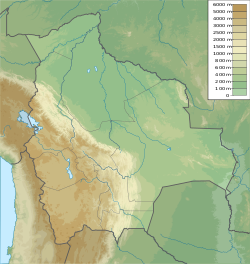Pircancha Formation
| Pircancha Formation | |
|---|---|
| Stratigraphic range: Floian-Dapingian ~ | |
| Type | Geological formation |
| Thickness | 1,800 m (5,900 ft) |
| Lithology | |
| Primary | Mudstone |
| Other | Shale, sandstone, pyrite |
| Location | |
| Coordinates | 21°00′S 65°00′W / 21.0°S 65.0°W |
| Approximate paleocoordinates | 45°18′S 129°06′W / 45.3°S 129.1°W |
| Region | Tarija Department |
| Country | |
The Pircancha Formation is a Floian to Dapingian geologic formation of southern Bolivia. The green mudstones, shales and sandstones were deposited in a shallow to open marine environment.[1][2] The fossil Pircanchaspis rinconensis is named after the formation.
Fossil content
[edit]The formation has provided the following fossils:
See also
[edit]References
[edit]- ^ "Rincon", "Escuela Seccional de Puesto Grande" at Fossilworks.org
- ^ Pircancha Fm., Tarija and Chilcayo at Fossilworks.org
- ^ Aubrechtová, 2015
Bibliography
[edit]- Aubrechtová, Martina (2015), "A revision of the Ordovician cephalopod Bactrites sandbergeri Barrande: systematic position and palaeobiogeography of Bactroceras", Geobios, 48 (3): 193–211, Bibcode:2015Geobi..48..193A, doi:10.1016/j.geobios.2015.03.002, retrieved 2019-03-03
Further reading
[edit]- B.-D. Erdtmann, B. Weber, H.-P. Schultze and S. Egenhoff. 2000. A possible agnathan plate from the lower Arenig (Lower Ordovician) of South Bolivia. Journal of Vertebrate Paleontology 20(2):394-399
- M. Toro and S. Fernandez. 1979. Los fósiles de la formación Pircancha aflorante en Chilcayo, Provincia Méndez - Depto. Tarija. Revista de la Academia Nacional de Ciencas de Bolivia 163-169


 French
French Deutsch
Deutsch